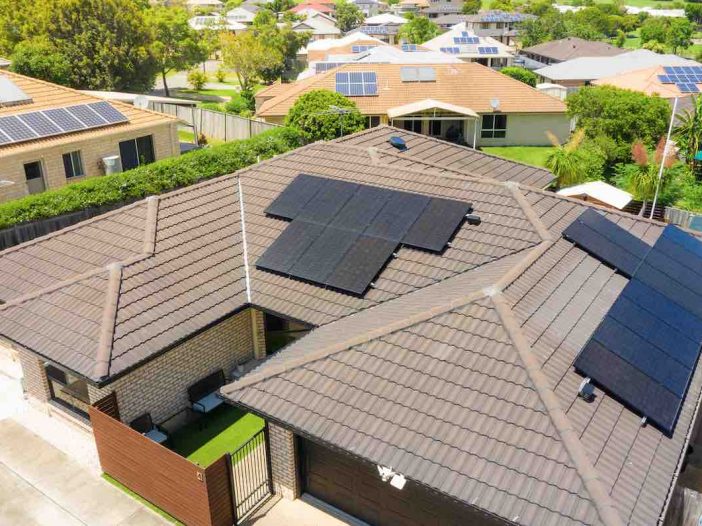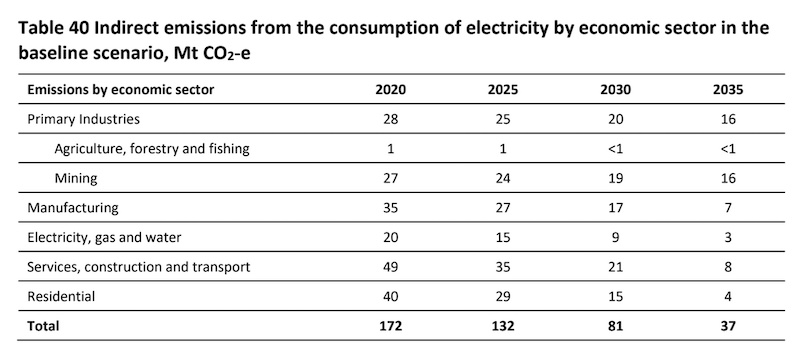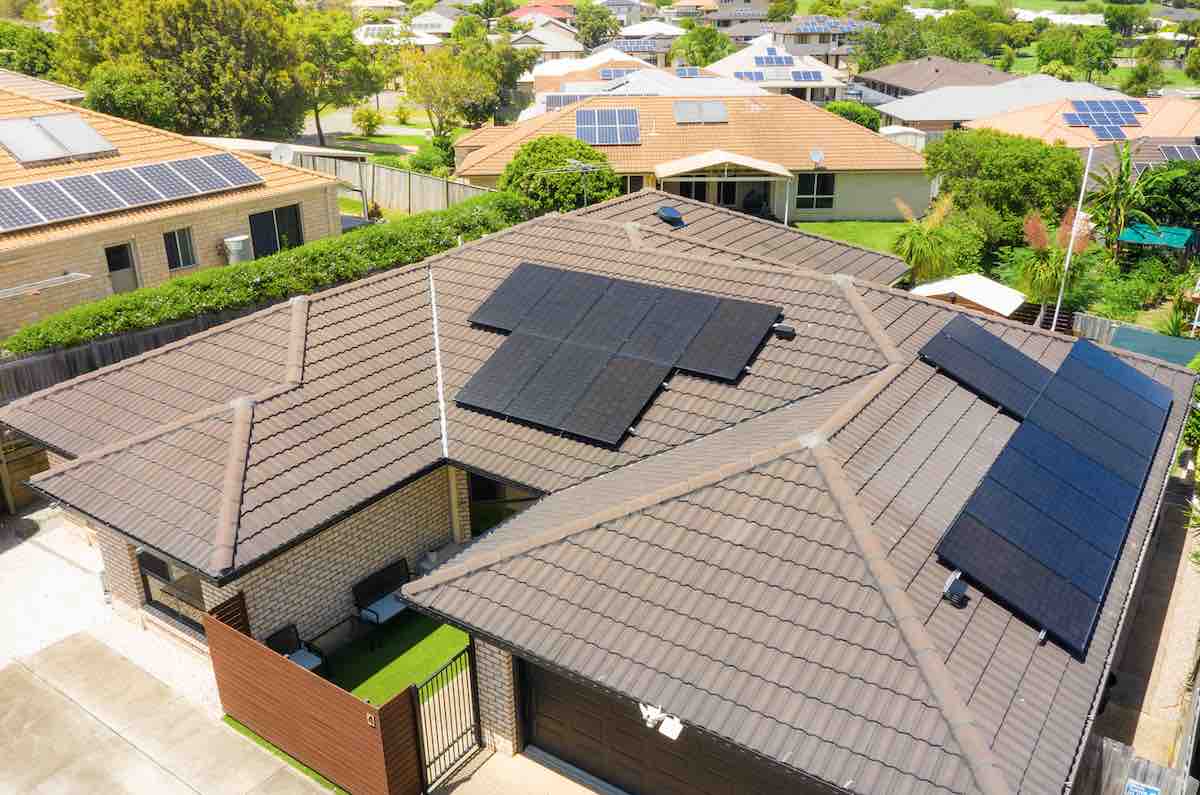
The Albanese government has “noted” – but not agreed to – a recommendation from the Climate Change Authority to extend the federal rooftop solar subsidy beyond 2030 and expand it to include household batteries.
A proposal to extend the Small-scale Renewable Energy Scheme post-2030 and expand it to include home batteries as well as private electric vehicle chargers was one of 42 recommendations put forward by the CCA in its annual report on Australia’s climate progress, published Thursday.
The Climate Authority’s report warns that Australia is going too slow on emission cuts, and will have to boost its efforts by nearly half – from an average annual cut of 12 million tonnes of CO2 equivalent to 17mt – to meet its 2030 and its 2050 targets.
“This a significant challenge that is getting harder as time runs out,” the report says. “Australia needs a big upwards shift in momentum.”
The CCA says the key to boosting momentum will be in cutting emissions in the electricity grid, and meeting the federal government target of 82 per cent renewables by 2030. Australian households will play a key role in this.
The federal government last month announced that it would not be extending the large scale renewable energy target, as many in the industry had urged, and would replace it with an expanded Capacity Investment Scheme.
The industry is still trying to wrap its head around that, and is awaiting details, but has been arguing that the household sector needs attention, which means that the CCA report is timely.
According to the CCA, in 2022-23 just over 3GW of small-scale solar was installed in Australia, with approximately 7% of the rooftop PV systems installed believed to include battery storage. For the calendar year up to 30 June, 2023, however, this figure amounted to just 2%.
It also notes that a scenario modelled by AEMO of greater than 80% renewable energy generation indicates that
around 1MW of small-scale battery storage is needed for every 3MW of rooftop PV installed in the NEM by 2030.
Indeed, in the federal government’s own report on the latest emissions data and projections, the largest decline in indirect electricity emissions has been in the residential sector, thanks to the huge uptake of rooftop solar – and households are expected to continue to do the heavy lifting.
“In 2023 the residential sector accounted for 40 Mt CO2-e of indirect electricity emissions. This is projected to decline by 89% to 4 Mt CO2-e in 2035 and reduce its share of indirect emissions from 26% in 2023 to 12% in 2035 in the baseline and ‘with additional measures’ scenario.”

What’s bothering the Climate Authority is that, beyond 2030, there will be no federal policy supporting the ongoing uptake of rooftop solar. And in the remaining years of the SRES, when rooftop solar uptake is expected to increase, the subsidy provided will be ratcheting down under the rules of the scheme.
“The authority is of the view that the government should consider extending the Small-scale Renewable Energy Scheme deeming period past 2030 and expanding the types of technologies eligible for support,” the report says.
“If the scheme is extended past 2030, the authority considers that it would be useful for data to be collected
on installations by grid as well as by postcode to help track the decarbonisation of each grid.
“Expanding eligible technologies to include household batteries and electric vehicle chargers would incentivise their deployment and provide valuable data on the roll-out of these technologies.”
“In developing the National Energy Performance Strategy, the government should have regard to AEMO’s
Integrated system Plan and coordinate with AEMO, ARENA and CSIRO to incentivise the best mix of distributed energy resources for a stable grid,” the report also says.
“The Strategy should also support continued investment in distributed energy resources and demand response.
“The authority is of the view that the National Energy Performance Strategy should give particular consideration to supporting low-income households, renters, public housing tenants, apartments and regional, remote and First Nations communities.”
Better access to solar and batteries – and fast!
The call for an extension of the SRES and for the federal government to start subsidising – or at least incentivising – the uptake of home battery storage has been building over the course of the year, including from renewable energy lobby groups and consumer energy advocates.
“Consumer Energy or DER is critical as we seek to decarbonise our energy system,” says Nexa Advisory principal Stephanie Bashir.
“Giving people incentives to do so is even more critical in a cost of living environment as solar rooftop and batteries directly reduce consumer bills.
“The SRES to date has been a significant tool to get more Australians access to rooftop. That is why expanding the SRES to include new energy clean technologies such as batteries is so important,” Bashir says.
“We need all Australians to have access to solar and batteries and fast!”
Yeah, nah
But the federal government is not yet convinced. On Thursday it revealed it had either agreed, agreed-in-principle or noted 39 out of the 42 recommendations put forward by the Climate Authority. The call to extend the SRES landed in the “noted” category.
That’s not a “no,” but definitely not a “yes” – and not even a “maybe,” which appears to be expressed in this case as “agree-in-principle.”
In a more detailed written response to the SRES recommendation, the government says it recognises a further major role for distributed and consumer energy resources and will continue to send “strong policy signals” through the SRES to 2030.
But in terms of energy storage, it’s sticking to its plan of focusing on subsidising community batteries, instead of batteries in the home.
“The Government is well-progressed in the roll-out of 400 community batteries under the Community Batteries for Household Solar program, and has announced joint solar energy sharing programs with the ACT and Victoria for apartment dwellers, including renters and low-income households, through the Community Solar Banks program,” it says.

Sophie is editor of One Step Off The Grid and editor of its sister site, Renew Economy. Sophie has been writing about clean energy for more than a decade.

